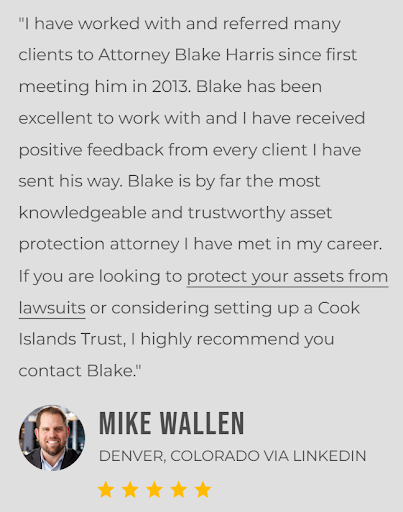Quick Summary
A Cook Islands Trust protects assets from lawsuits, creditors, and other risks. This article breaks down its structure, costs, and benefits, including strong legal protections and potential tax advantages. It also covers key pricing factors and why expert guidance matters.
Is a Cook Islands Trust Worth It?
A Cook Islands Trust is one of the best ways to protect assets from lawsuits, creditors, and legal threats. It keeps wealth secure and private, which makes it a popular choice for people who want real financial protection.
The numbers back this up. From 2020 to 2023, the Cook Islands’ trust industry grew steadily, contributing NZD 57.2 million (9.6%) to the country’s GDP. Registered entities increased by 3.89% in 2023/2024, too.
This Blake Harris Law guide breaks down what a Cook Islands Trust costs and why so many people rely on it.
Why Listen to Us?
At Blake Harris Law, we focus on offshore asset protection and have helped countless clients safeguard their wealth with Cook Islands Trusts. Our experience with these trusts has made a real difference for individuals facing lawsuits, creditor claims, and other financial risks.
What Is a Cook Islands Trust?
A Cook Islands Trust shields your assets behind the world’s strongest asset protection law—the Cook Islands Trust Act. While most asset protection structures face jurisdictional challenges, a Cook Islands Trust eliminates this problem by protecting the settlor’s assets during divorce proceedings and lawsuits.
An offshore trustee holds legal ownership of the trust’s assets, creating a solid barrier against claims. For creditors to access these assets, they need to:
- Prove claims beyond a reasonable doubt
- File within strict time limits
- Meet strict statutory requirements
These trusts have consistently protected wealth from litigation, business risks, and divorce. With a proven track record in court and strict confidentiality standards, they remain the gold standard for asset protection.
Why Should You Open a Cook Islands Trust?
A Cook Islands Trust offers comprehensive asset protection and financial security. Here are the top reasons to set one up:
- Asset Protection: Cook Islands laws shield assets from creditors, lawsuits, and divorce claims by requiring claimants to prove their case beyond a reasonable doubt.
- Confidentiality: These trusts maintain strict privacy standards, ensuring your financial affairs remain private and secure.
- Global Control: You maintain control over your assets through a carefully structured trust while benefiting from Cook Islands’ protective jurisdiction.
- Tax Benefits: These trusts can offer tax advantages depending on your specific situation and jurisdiction.
- Asset Flexibility: Cook Islands Trusts can hold all kinds of assets including real estate, investments, and cryptocurrencies.
What Does the Structure of Cook Islands Trust Look Like?
The structure of a Cook Island Trust plays a huge role in keeping your assets secure. Here’s how a Cook Islands Trust is built and who’s involved:
- Settlor: You—the person setting up the trust and putting assets into it. Once it’s set up, you hand over legal ownership of these assets to shield them from personal liability.
- Trustee: A licensed professional in the Cook Islands who runs the trust. They legally own the assets but must follow your trust’s rules and put the beneficiaries’ interests first.
- Protector (optional): The person in charge of oversight. They keep an eye on the trustee and can replace them if needed to make sure your wishes are followed.
- Beneficiaries: The people or groups who get the benefits from your trust. They receive money or assets based on how you’ve set up the rules.
- Trust Deed: Your rulebook. It lays out how to handle the assets, who gets what, and what the trustee can do.
This setup creates a legal barrier between you and your assets. While you maintain control, creditors face a tough time trying to get their hands on anything in the trust.
Cook Islands Trust Cost Breakdown
The cost of establishing and maintaining a Cook Islands Trust includes several components, each tailored to the trust’s complexity and specific needs.
Below is a detailed breakdown of these costs:
1. Initial Setup Costs
Setting up a Cook Islands Trust requires two main upfront fees:
- Legal costs
- Trustee fees
For legal work, expect to pay between $15,000 to $30,000. This covers consultation, drafting your trust deed, and structuring your asset protection strategy. The more complex your situation and assets, the higher this cost.
You’ll also need to pay a trustee acceptance fee to get started. Professional trustees in the Cook Islands typically charge between $1,000 and $3,000 to take on a new trust. This is a one-time fee that gets your trust up and running with your chosen trustee.
2. Annual Maintenance Costs
Two main costs keep your trust running each year:
- Trustee fees
- Compliance and reporting costs
Your trustee will charge between $5,000 to $10,000 annually to manage your trust. This fee varies based on how many assets you have and how complex they are to manage.
You’ll also pay $500 to $2,000 yearly for compliance and reporting. This covers the trustee’s work to keep your trust in line with Cook Islands laws and maintain all required records.
3. Additional Costs
Moving assets into your trust brings its own set of expenses:
- Asset transfer fees: $1,000 to $10,000 depending on what you’re transferring. Property transfers, investment account moves, and title changes each come with their own costs.
- Banking setup: $1,000 to $3,000 to open offshore accounts for your trust, plus ongoing maintenance fees.
- Protector fees: If you choose to have a protector, plan on $1,000 to $5,000 per year based on how involved they need to be.
Total Cost of Setting Up & Managing a Cook Islands Trust
For your first year, expect to spend between $25,000 to $50,000 total. This includes all setup fees, annual maintenance, and the standard additional costs like asset transfers and banking setup.
After that, you’ll pay $5,000 to $10,000 annually to maintain your trust, with most trusts running around $6,000 per year.
Remember: choosing the cheapest option isn’t always smart. Focus on quality service that will protect your assets when you need them. Also keep in mind that your trust doesn’t change your local tax obligations – you’ll still need to handle those separately.
What Influences a Cook Islands Trust’s Cost?
Several factors influence the cost of a Cook Islands Trust:
- Trust Complexity: Complex structures or additional clauses in the trust deed increase setup and maintenance costs.
- Type and Value of Assets: High-value or diverse asset types require more management, impacting fees.
- Trustee Services: The scope and level of service provided by the trustee affect ongoing costs.
- Protector Appointment: Engaging a protector adds to both initial and annual fees.
- Compliance Requirements: Regulatory and reporting obligations, which vary by jurisdiction and client profile, affect administrative costs.
These factors determine the trust’s overall cost, tailored to individual needs and goals.
How to Open a Cook Islands Trust
1. Consultation and Planning
The first step in setting up a Cook Islands Trust is a thorough consultation with an asset protection attorney to define your goals and structure. This process ensures your trust is legally compliant and tailored to your unique needs.
Consulting a Cook Islands trust attorney is crucial to ensure your trust structure complies with legal standards and meets your asset protection goals.
Key actions during consultation include:
- Identifying high-risk assets for protection, such as real estate, investments, or intellectual property.
- Analyzing creditor risks and potential legal threats to align the trust structure with jurisdictional advantages.
- Collaborating on drafting a preliminary trust outline that complies with the Cook Islands’ asset protection laws.
This stage demands expertise in offshore legal frameworks and careful attention to financial strategies.
At Blake Harris Law, we offer personalized consultations to ensure each client’s trust is aligned with their financial goals while meeting the stringent legal standards required for maximum protection.
2. Trust Creation
Creating the Cook Islands Trust involves drafting a comprehensive trust deed and appointing a licensed trustee in the Cook Islands. This stage formalizes the trust structure and ensures compliance with the jurisdiction’s robust legal standards.
Key tasks include:
- Drafting the trust deed to clearly outline terms, beneficiaries, and trustee responsibilities.
- Selecting a reputable trustee from established Cook Islands trust companies to ensure compliance and effective asset management.
- Ensuring the trust adheres to specific asset protection provisions, such as the non-recognition of foreign judgments.
Our attorneys at Blake Harris Law collaborates with established Cook Islands trustees and provides guidance to streamline this complex legal process efficiently.
3. Funding the Trust
Funding a Cook Islands Trust requires transferring assets into the trust to activate its protective features. This step demands precision to ensure compliance and maintain legal separation from personal ownership.
Key considerations include:
- Properly documenting the transfer of assets, such as bank accounts, real estate, or investments.
- Adhering to international regulations, especially for cross-border transfers.
- Coordinating with trustees to ensure seamless integration of assets into the trust structure.
At Blake Harris Law, our asset protection team provides guidance to ensure assets are securely and correctly transferred.
Interested in a Cook Islands Trust? Speak with Blake Harris Law
A Cook Islands Trust provides unparalleled asset protection, ensuring your wealth is secure from lawsuits, creditors, and other threats. With clear costs and significant benefits, it’s a valuable tool for financial security.
So, let Blake Harris Law guide you through the process.
At Blake Harris Law, we specialise in asset protection, including Cook Islands Trusts. Our team provides guidance tailored to your unique needs, ensuring transparency, compliance, and peace of mind.
Secure your financial future today—contact Blake Harris Law to get started!



